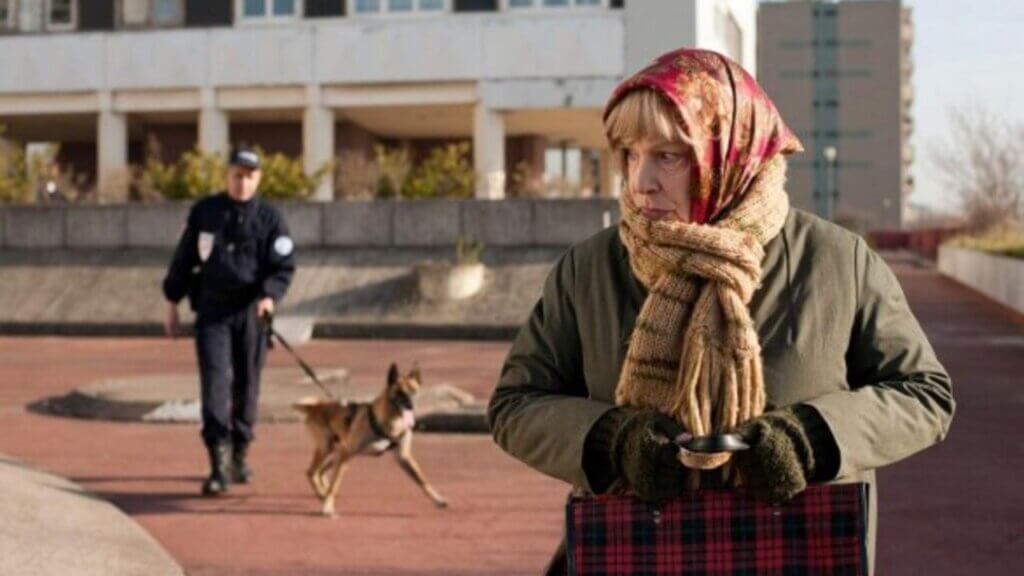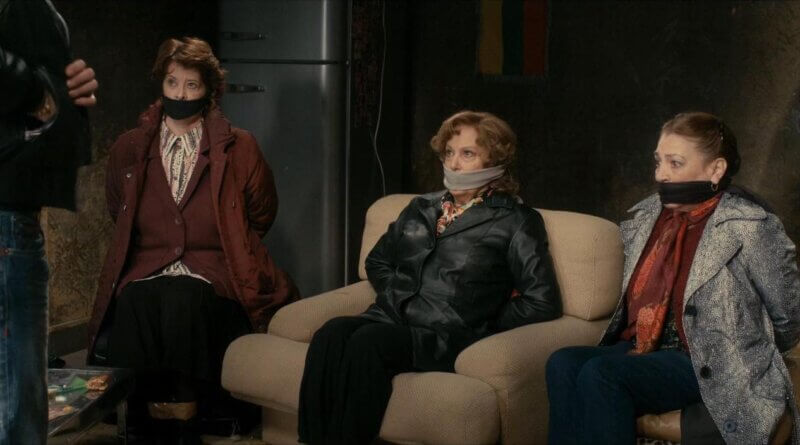Review: Paulette (2012), the Worst French Film Ever Made
France has produced some of the greatest actors, directors, and films of all time. French culture prides itself on the quality of its art, particularly in the sphere of filmmaking. Yet, the drive for increased box office returns often turns authentic artisans into shallow profiteers. Director Jérôme Enrico doesn’t have a long history of great films and, based on his existing work in film and television, he began working in a system designed to churn out profitable garbage. So, without further delay, let’s look at the worst French film I’ve ever had the displeasure of reviewing, Paulette (2012).
The story begins with the titular old curmudgeon, Paulette (Bernadette Lafont), digging through garbage bins looking for fresh vegetables. Despite her ostensible desolation, Paulette finds the time to look down her nose at most everyone she encounters. She has a particularly nasty view of foreigners and people of color. When she’s not fighting vagrants for vegetables, Paulette spends her days lamenting her late husband and the brasserie they used to own, which has since been turned into a Chinese restaurant. We’re made to believe that this is the cause of her xenophobia, though she seems much angrier at black people than anyone of Asian descent.
In any case, we soon come to find out that Paulette’s daughter, Agnès (Axelle Lafont), has a 7-year-old son, Leo. Leo’s father, Ousmane (Jean-Baptiste Anoumon), is a police detective who — cue the gasp — is black! Even though Agnès frequently leaves Leo in Paulette’s care, Paulette resents him for being half black. She shows equal hatred for Ousmane, who, despite his best efforts, cannot win her over. Agnès is also the object of Paulette’s vitriol for the unforgivable act of “race-mixing.”
So, to recap, Paulette is bitter, mean, lonely, racist, and poor. It’s the last attribute that drives the story forward, as her pension is not enough to live on. Repo men arrive at her apartment to reclaim her television, antique furniture, and other items of value. Paulette tries to call the courts to make a complaint, but she doesn’t even have enough money to pay her phone bill.
Later, while digging through the garbage for valuables, Paulette sees a group of drug dealers hanging out at her building. They’re exchanging large amounts of cash. The next day, Paulette approaches the head drug dealer, Vito (Paco Boublard), to ask if she can become one of his lackeys. Initially, Vito dismisses Paulette and throws her out. Nonetheless, Paulette persists. Eventually, Vito decides to give her a chance, because that’s how drug dealers operate.
As it turns out, Paulette becomes the best cannabis dealer in the neighborhood. While this enables Paulette to pay her bills and replace her television, it also draws negative attention from rival dealers. As Paulette’s business grows, she finds herself unable to keep it a secret from her nosy friends. So, three more old ladies join her squad and begin baking “space cookies” for an ever-growing crowd of interested buyers. Unfortunately for Paulette, her business begins drawing even more attention from neighbors, drug kingpins, and even her son-in-law. While Paulette struggles to keep her business a secret, she also struggles with her own feelings toward her family and her many multi-ethnic drug-dealing associates.

Before I saw Paulette (2012), I thought that 10 Jours en or (2012) was the worst French film of all time. Perhaps 2012 was just a bad year in France. Who knows. Anyway, Paulette shares many of the same nauseating features as the latter film. Both feature race tension as a central element of the plot. Both films include a young, naive black child who strives to be loved and accepted by his older, white caretaker. Finally, both films beat you over the head with their moral vision, while also showing a sycophantic appreciation of highly-formulaic American dramedies.
To provide some additional insight, I will readily admit that I am a huge fan of French cinema, but not of French comedy. For me, French comedy seems to exist in a world of its own. The subtlety of French art cinema is completely lost in its comedy and replaced with slapstick antics and obvious one-liners. In all fairness, I may have just seen a lot of bad French comedies. If any readers know of some great French comedy films, I’m open to suggestions.
In any case, the brand of humor in Paulette is built upon surprising juxtapositions and the inherent comedy of old curmudgeons. The primary juxtaposition is between Paulette, an uppity old lady with hatred for foreigners and people of color, and the seedy, often dangerous world of drugs in Paris, which apparently is mostly populated by foreigners and people of color. Thus, in the world of Paulette, racism plus old-lady-drug dealing equals comedy.
However, it’s not just the poor comedy that drags Paulette down. French films that copy American storytelling practices often take notes from some of the worst that Hollywood has to offer. If not for the cursing, racial slurs, and drug use, Paulette would not look out of place as a made-for-TV movie on the Hallmark Channel. As the story progresses, it becomes increasingly ridiculous, with an ending that is both embarrassing and confusing. I feel that it’s not ruining anything to say that Paulette has a happy ending, as it is simply one of those kinds of films. Paulette encounters conflict, but after some goofy mishaps, the conflict is resolved. Roll credits.
As one could guess, Paulette does eventually see the error in her racist and xenophobic ways. This is by far the most disingenuous aspect of the film. I’ve met many racist and xenophobic people in my lifetime. I don’t mean to sound defeatist, but most of them are set in their ways. Spending a little extra time with people of color is not likely going to change their mindset. However, director Jérôme Enrico has a much sunnier view of racial tension among older generations.
Paulette Movie Rating: ★ out of 5
In short, Paulette (2012) does not subvert expectations, but instead presents the unrealistic moral journey of a racist, xenophobic old woman. So, if you’ve ever seen a formulaic comedy starring an older woman, you’ve seen Paulette (2012). As soon as you realize that there’s an old, racist woman selling cannabis, you can predict the rest of the film. That said, Paulette may be enjoyable for those who like to watch terrible movies, knowing in advance that they’re bad. It’s mindless entertainment with a tidy, albeit confusing resolution; nothing more and nothing less.
If you’d like to watch Paulette (2012), it is currently available to stream, rent, or purchase via Amazon. For more film reviews like this one, be sure to visit the Philosophy in Film Homepage!

